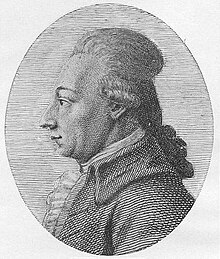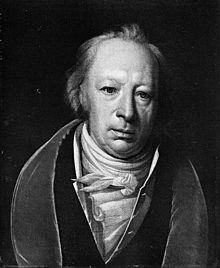Friedrich August Wolf
Friedrich August Christian Wilhelm Wolf (born February 15, 1759 in Hainrode ; † August 8, 1824 in Marseille ) was a German classical philologist and scholar.
Life
Friedrich August Wolf was the son of a cantor in Hainrode in the Prussian office of Lohra . In 1768 the family moved to the nearby imperial city of Nordhausen , where the father worked as a girl teacher and later as an organist. Friedrich August Wolf attended the Nordhäuser Gymnasium and studied philology in Göttingen from 1777 . After two years of study, he went to Ilfeld as a collaborator on recommendation . In 1782 he married and became rector of the city school in Osterode , where he stayed for a year. Since 1783 he was a Freemason member of the lodge to the golden circle in Göttingen, later he also appears in the lists of the lodge to the three swords in Halle.
In 1783 Wolf took over a professorship in Halle , initially for philology and pedagogy , from 1784 for philology and eloquence . In 1787 he founded the philological seminary there. In 1793 he became a member of the Masonic lodge to the three swords in Halle. On February 21, 1799, Wolf was elected almost unanimously as a foreign member of the Academy of Sciences in Berlin. In 1805 he was given the title of Privy Councilor .
After Napoleon Bonaparte closed the university in Halle in 1806, Wolf moved to Berlin in April 1807 and has worked at the academy since then, without changing his status as a foreign member. In 1810 he became director of the scientific deputation for the section of public education in the ministry and professor of classical philology. In 1812 he was made an honorary member of the Academy of Sciences in Berlin. Since 1819 he was a foreign member of the Académie des inscriptions et belles-lettres . In April 1824 he traveled to France, where he died.
In honor of his work in philology, a medal was dedicated to him by the Assembly of German Philologists and School Men in 1840. In Nordhausen a street in which he lived was named after him and a memorial plaque was attached to his house, Wolfstraße 7; The street and house were destroyed in the air raids on Nordhausen in 1945.
plant
His main work is his work Prolegomena ad Homerum , which was written in 1795 and remained fragmentary , in which he critically examined the works of Homer for their origin and cast him into doubt as the only author ( Homeric question ). The archeology owes Friedrich August Wolf her new recognition as a universal discipline, in the sense of humanism (the ultimate purpose of existence is the formation of individuality), which he closely associated with Wilhelm von Humboldt , Johann Wolfgang von Goethe and Friedrich Schiller justified. Classical philology should also play an essential role in the school system and help people achieve a harmonious education.
Fonts (selection)
- Antiques of Greece. Hammerde, Halle 1787.
-
Prolegomena ad Homerum. Hall 1795.
- Prolegomena to Homer. 1795 . Reclam, Leipzig [1908] (German).
- Prolegomena to Homer. 1795 . Princeton Univ. Press, Princeton, NJ 1985. ISBN 0-691-10247-3 .
- Presentation of ancient science. Berlin 1807. (Reprinted by Acta Humaniora. Weinheim 1986) ISBN 3-527-17552-0 .
- Friedrich August Wolf, Philipp Buttmann : Museum of Ancient Studies. Realschule bookstore, Berlin 1807, 1st volume.
- Friedrich August Wolf, Philipp Buttmann: Museum of Ancient Studies. Realschule bookstore, Berlin 1810, 2nd volume.
- (Ed.): Literary analects excellent for all literature and art, their history and methodology. 4 parts, GC Nauck, Berlin (1816 and 1818).
- Encyclopedia of Philology . Expedition d. Europ. Overseer, Leipzig 1831.
-
Small fonts in Latin and German. Olms, Hildesheim 2003.
- Vol. 1. Scripta latina. ISBN 3-487-12033-X .
- Vol. 2. German essays. ISBN 3-487-12034-8 .
Known students
- Immanuel Bekker (1785-1871).
- August Ferdinand Bernhardi (1769-1820).
- Gottfried Bernhardy (1800-1875).
- August Boeckh (1785-1867).
- Gabriel Gottfried Bredow (1773-1814).
- Friedrich Delbrück (1768-1830).
- Johann Friedrich Ferdinand Delbrück (1772–1848).
- Joseph von Eichendorff (1788-1857).
- Georg Gustav Fülleborn (1769–1803).
- Friedrich August Gotthold (1778-1858).
- Karl Wilhelm Göttling (1793–1869).
- Friedrich David Gräter (1768-1830).
- Ludwig Friedrich Heindorf (1774-1816).
- Friedrich von Heyden (1789-1851).
- Wilhelm Theodor Hundiker (1786–1828).
- Christian Ludwig Ideler (1766-1846).
- Isaak Markus Jost (1793-1860).
- Georg Koës (1782-1811).
- Johann Philipp Krebs (1771-1850).
- Konrad Levezow (1770-1835).
- Karl Morgenstern (1770-1852).
- Hieronymus Müller (1785–1861).
- Karl Otfried Müller (1797-1840).
- Wilhelm Müller (1794-1827).
- Johann Wilhelm Oelsner (1766-1848).
- Friedrich Gotthilf Osann (1794-1858).
- Franz Passow (1786-1833).
- Friedrich Eberhard Rambach (1767-1826).
- Friedrich Wilhelm Riemer (1774-1845).
- Friedrich Schleiermacher (1768–1834).
- Friedrich Gotthelf Benjamin Schmieder (1770–1838) studied Protestant theology and was a philologist , book author , schoolboy and from 1804 until his death rector of the Royal High School in Brieg .
- Arthur Schopenhauer (1788-1860).
- Johannes Friedrich Ludwig Schröder (1774–1845).
- Johannes Schulze (1786–1869).
- Karl Wilhelm Ferdinand Solger (1780-1819).
- Georg Ludwig Spalding (1762-1811).
- Johann Wilhelm Süvern (1775–1829).
- Friedrich August Ukert (1780-1851).
- Heinrich Voss (1779-1822).
- Wilhelm Wachsmuth (1784–1866).
- Leopold Zunz (1794–1886).
literature
- August Baumeister : Wolf, Friedrich August . In: Allgemeine Deutsche Biographie (ADB). Volume 43, Duncker & Humblot, Leipzig 1898, pp. 737-748.
- Georgios Fatouros : WOLF, Friedrich August Christian Wilhelm. In: Biographisch-Bibliographisches Kirchenlexikon (BBKL). Volume 13, Bautz, Herzberg 1998, ISBN 3-88309-072-7 , Sp. 1501-1504.
- Salvatore Cerasuolo (Ed.): Friedrich August Wolf e la scienza dell'antichità . Univ., Naples 1997.
- Otto Kern : Friedrich August Wolf . Niemeyer, Halle 1924.
- Otto Kern: Friedrich August Wolf In: Central German Life Pictures. Volume 1, Life Pictures of the 19th Century, Magdeburg 1926, pp. 1–11.
- Dr. Wilhelm Körte: Life and Studies Friedr. Aug. Wolf's, the philologist. GD Bädeker, Essen (1833) 2 parts, online at the Bavarian State Library.
Web links
- Literature by and about Friedrich August Wolf in the catalog of the German National Library
- Works by and about Friedrich August Wolf in the German Digital Library
- Entry on Friedrich August Wolf in the Catalogus Professorum Halensis
- Friedrich August Wolf: Prolegomena zu Homer , 1795; in the project "Poetry Theory"
- Reinhard Markner: Friedrich August Wolf. A bibliography
- Museum of Classical Studies , edited by Friedrich August Wolf, digital copy from Heidelberg University Library
Individual evidence
- ^ Geographical statistical-topographical lexicon of Upper Saxony , Stettinische Buchhandlung, 1803, p. 29
- ↑ a b For the 150th birthday of a famous Hohensteiner . in: home country. Illustrated sheets for the local history of the Grafschaft Hohenstein district, the Eichsfeld and the adjacent areas , 1909. ( digitized version )
- ^ Friedrich August Eckstein: History of the Masonic Lodge in the Orient of Halle. A ceremony for the secular celebration of the lodge to the three swords . Gebauer Buchdruckerei, Halle 1844, p. 251 ( digitized version )
- ^ Adolf Harnack : History of the Royal Prussian Academy of Sciences in Berlin, edited on behalf of the Academy. , Berlin 1900: From the Death of Frederick the Great to the Present, Vol. 1, Part 2 , pp. 532f., Note 2.
- ↑ Stefan Krmnicek, Marius Gaidys: Taught images. Classical scholars on 19th century medals. Accompanying volume to the online exhibition in the Digital Coin Cabinet of the Institute for Classical Archeology at the University of Tübingen (= From Croesus to King Wilhelm. New Series, Volume 3). University Library Tübingen, Tübingen 2020, pp. 69–71 ( online ).
| personal data | |
|---|---|
| SURNAME | Wolf, Friedrich August |
| ALTERNATIVE NAMES | Wolf, Friedrich August Christian Wilhelm |
| BRIEF DESCRIPTION | German classical philologist and scholar |
| DATE OF BIRTH | February 15, 1759 |
| PLACE OF BIRTH | Hainrode |
| DATE OF DEATH | August 8, 1824 |
| Place of death | Marseille |


